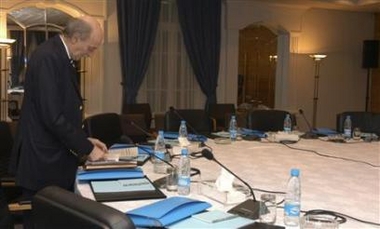 BEIRUT (Reuters) – Rival Lebanese leaders will meet again on Thursday to try to agree on a government reshuffle following two days of talks aimed at defusing a political crisis that has threatened to spill into the streets. The talks, which began on Monday with a pledge by Lebanon’s politicians to refrain from attacking each other in the media, focused on Tuesday on the key issue —
BEIRUT (Reuters) – Rival Lebanese leaders will meet again on Thursday to try to agree on a government reshuffle following two days of talks aimed at defusing a political crisis that has threatened to spill into the streets. The talks, which began on Monday with a pledge by Lebanon’s politicians to refrain from attacking each other in the media, focused on Tuesday on the key issue —
Parliament Speaker Nabih Berri, who convened the talks, described the session as "frank, deep and rich" and said the leaders would use the break to consider various proposed compromises such as expanding the government to include more opposition members"Bringing down the government is not proposed. Personally, I am not proposing a new prime minister or a new government statement or a vote of confidence in the government," Berri told reporters after the session.
"The government could expand or contract. In this case, participation cannot be except with more than a third." He set Thursday as the date for the next meeting.A political source said the leaders had not made major progress and divisions remained deep, but that Thursday’s session could be decisive.
Hezbollah, has led calls for a change in the government now dominated by anti-Syrian politicians from the majority bloc in parliament.
Hezbollah accuses the coalition led by Prime Minister Fouad Siniora of failing to back it during the war and supporting U.S.-Israeli demands for the disarmament of its guerrillas.
The group, popular with Lebanon’s large Shi’ite Muslim community, has suggested to stage mass demonstrations demanding new parliamentary elections unless more of its allies are admitted to the cabinet by mid-November.
Anti-Syrian politicians say they are willing to expand the government to include more opposition members but will not give them the crucial one-third of ministerial posts which would be enough to block motions in cabinet and automatically bring down the government if they resigned.
Hezbollah and its main ally Amal have five ministers in a government of 24. Pro-Syrian President Emile Lahoud has one ally in the cabinet with the rest controlled by opponents of Syria.
Hezbollah wants its main Christian ally, Michel Aoun, who made a strong showing in last year’s elections, to join the government.
Demonstrations and counter-demonstrations by the pro- and anti-Syrian camps would further destabilize the country and could easily degenerate into violence.
The killing of former Prime Minister Rafik al-Hariri in 2005 led to mass protests against Syria, which many Lebanese blamed for the assassination. Syria has denied involvement.
Under international pressure, Damascus ended a 29-year military presence in its smaller neighbor and anti-Syrian politicians swept to victory in the ensuing elections.



